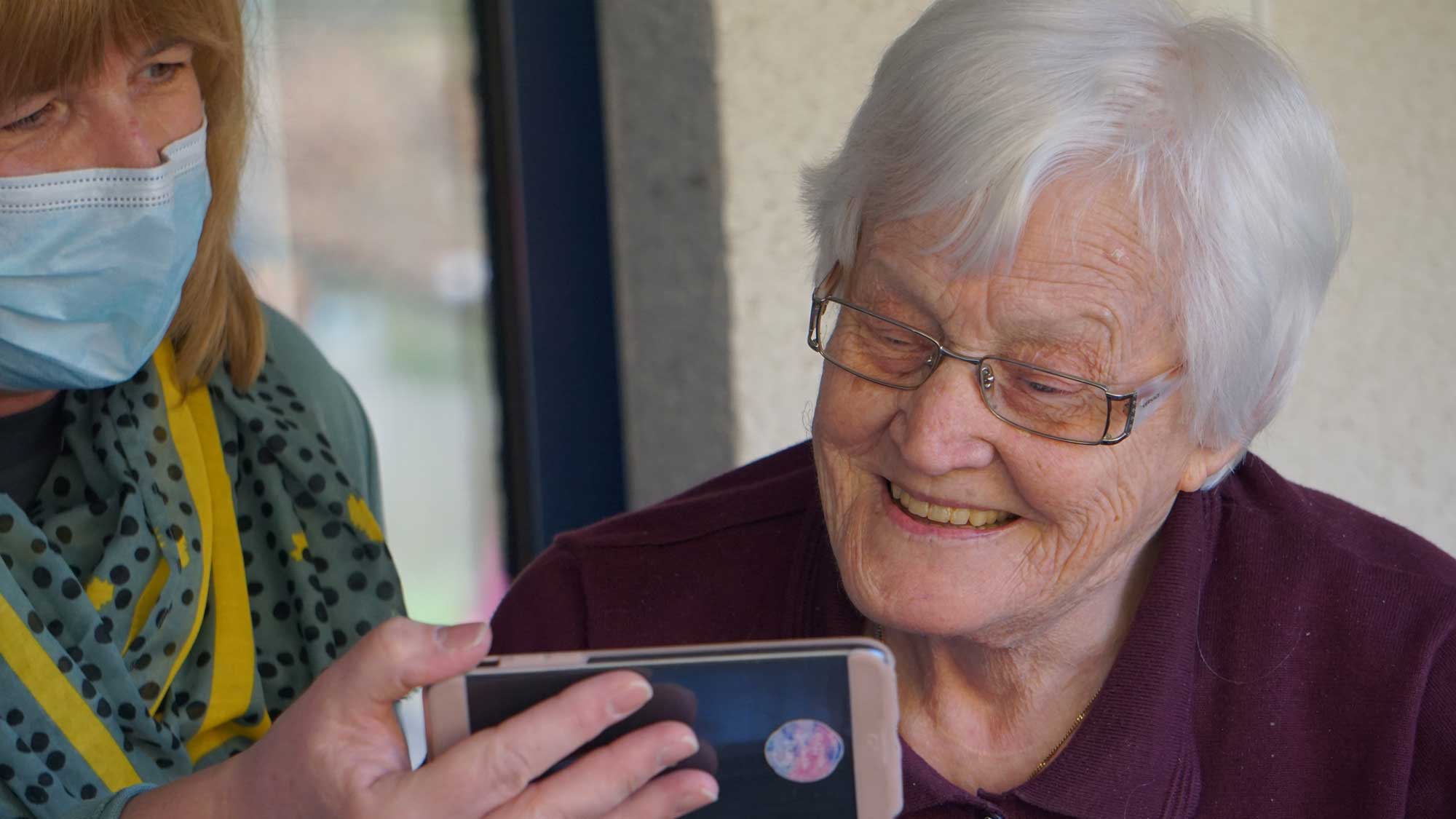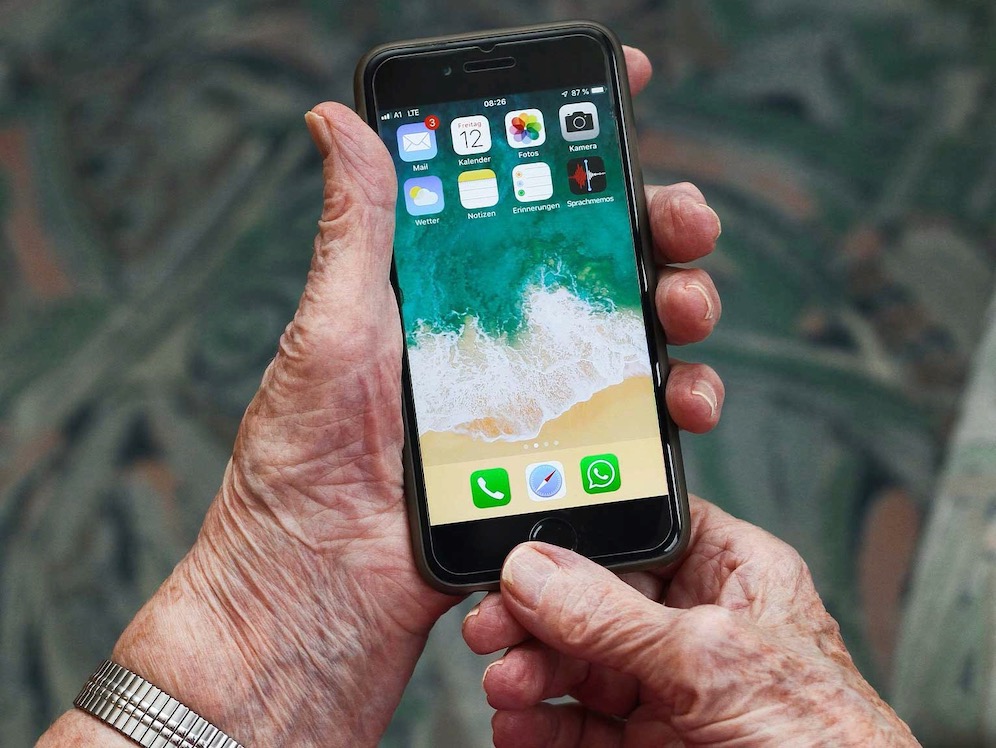
© georg-arthur-pflueger bei unsplash.com
“Older People Need ‘Digital Clinic’”
The corona crisis has made it clearer than ever: The older generation has been left behind digitally. As a risk group that is waiting it out at home or in care facilities, many older people are no longer able to communicate in a modern way or participate
It is one of the big dramas of the current crisis: Millions of senior citizens are sat in their own four walls or in care homes. Communication with relatives and friends is taking place via phone at the most. But the older people want to SEE their contact people. Tablets could help. The computer scientist Professor Herbert Kubicek from the University of Bremen already demanded better digital equipping and concrete help for the generation years ago.
Mr. Kubicek, two years ago, you asked politicians to immediately provide 3,000 senior citizen meeting points and care homes for the elderly with 33,000 tablets in order to make an entry into the digital world of communication easily possible for 300,000 aged people. Did they listen to you?
This demand was made in 2018 in the frame of a master plan that I created with the German Digital Opportunities Foundation after a successful pilot project loaning tablets. It was sent to several ministries and parties in government. I am not aware of any detailed action that was taken as a result of my request. However, a different part of the master plan was implemented in Bremen: Social participation is to be made possible for people who are supported at home because they cannot go to meeting points and do not yet want to move into a care home by means of “outreach digital assistance”. The new Bremen senate announced the promotion of such digital clinics in their coalition agreement.
It actually seems that millions of senior citizens are sitting in care homes or in their flats and can only phone their relatives at the most. Video chats or other technologies are unknown to them.
I wouldn’t say “unknown”, but rather “unusual” and sometimes “mysterious”. My interviews show that some of the older generation cannot afford a tablet and a contract. Others do not have the confidence to get to grips with strange and inestimable technology. They have no experience and therefore cannot suitably react to the connected problems. But we need to initially differentiate between access and usage. In terms of access, WIFI is slowly increasing in the care facilities, as is the availability of digital devices – mainly smartphones. However, the availability of a device does not automatically result in its usage. It is not the same as with a TV that you simply turn only and immediately see its use. The support infrastructure is missing.
Consequently – especially now in this crisis – many older people remain without contact possibilities that they could actually have?
Loneliness and a lack of communication possibilities for the older generation have not just been an issue since the corona crisis. People of this generation often have relatives that live far away. And that loneliness makes people ill was also known beforehand. However, we are only starting to see how older people are shut out and left behind with the strict contact and visiting restrictions. If we do not do something now, we are leaving these people alone with their loneliness.

“If we do not do something now, we are leaving older people alone with their loneliness.”
Profile:
Herbert Kubicek (73) was professor of applied computer science with a focus on information management and telecommunication at the University of Bremen between 1988 and 2011. He is one of the founders of the Bremen Institute for Information Management (ifib), an independent institute affiliated with the University of Bremen. Furthermore, he initiated the German Digital Opportunities Foundation. Amongst other things, Kubicek made a name for himself with his research on digital citizen contribution and digital participation of elderly people and remains active in projects on these topics at ifib
In your “Usage and Uses of the Internet with Old Age” study that you presented together with Barbara Lippa, you stated two years ago: More than 10 million over 70-year-olds have never used the internet. Has something changed?
Maybe we’re only speaking of 9 or 9.5 million people now, as smartphone usage has actually increased. But usage does not always mean usage. Many older people have a smartphone and use it to phone people. But video calls are a complicated thing, as are online orders, or video chats with your general practitioner. The fact alone that you have to register and set a password that you should not write down is a completely new challenge.
Why is the hurdle so big?
Because many people that are now 70 or 80 years old did not get to know any digital applications during their careers. What is now a matter of course for younger generations, is something that they never got to experience or learn. Their children or grandchildren gift them smartphones and tables but how do you use them properly? Tablet courses, such as those offered by adult education centers, are simply not enough. What is needed is what we call “responsive assistance”, which reacts suitably to situations and needs in terms of the different barriers. The term “digital clinic”, which was used in the coalition agreement of the Bremen senate, is quite fitting. Something is moving forward – with our scientific accompaniment.
What is it in detail?
In the frame of a big pilot project on testing various new services for older people, the senator for finance also supported a pilot project on “outreach digital assistance”. It was carried out together with four welfare organizations who contribute a great deal to helping the aged in Bremen. Different needs became clear. Over 15 facilities responded to an initial invitation in December 2019 and voiced their interest in a “digital clinic network”. Additionally, government funding was won. It was planned to start everything with a kick-off meeting in May, which will now take place after the summer holidays.

©rupert B. auf pixabay
“Maybe it will improve thanks to the corona crisis. After the epidemic is also before the epidemic.”
The “emergency” tablets that you requested would have cost 50 million euros including support. Peanuts in comparison to the billions that are now to flow into school digitalization.
We tried to make that clear. But apparently the meaning of providing senior citizens with digital devices and applications was not and still is not seen. “Digitalization for all” can be regularly found in party programs or strategies for the future. But the reality is different. For example, many stores, doctor’s practices, banks etc. have disappeared from villages. Digital participation becomes an existential requirement in such cases. Let’s take a look at the reality: Do countryside citizens of 70 or 80 years of age actually shop online or bank online? They don’t. That is because no one has shown them how and no one is supporting them. Maybe it will improve thanks to the corona crisis. After the epidemic is also before the epidemic.